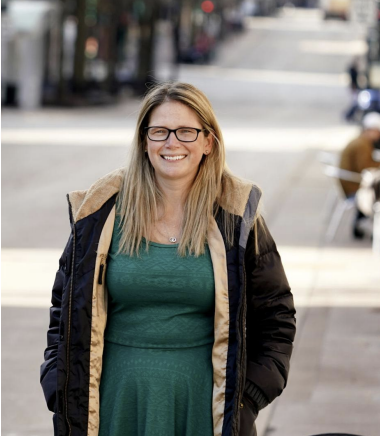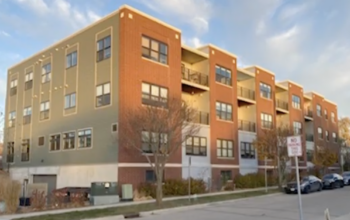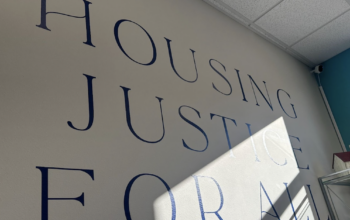As housing and rent prices continue to rise in Madison, design justice may be the key to affordable housing progress.
Madison organization sets an example for affordable housing amidst the city’s growing population to address the housing crisis within low-income communities.
 University of Wisconsin–Madison urban planning professor Kurt Paulsen describes the overarching narrative in Dane County as a shortage of housing, which means prices are rising and affordability will continue to be a struggle in Madison.
University of Wisconsin–Madison urban planning professor Kurt Paulsen describes the overarching narrative in Dane County as a shortage of housing, which means prices are rising and affordability will continue to be a struggle in Madison.
“On the extreme end, people who have [lower] income spend more than 50% of their income on rent,” said Paulsen. “You see people being doubled up [which] is overcrowding the housing. Young people can’t afford to buy a starter home. You see homelessness and of course it manifests itself in tremendous racial disparities in housing burdens and homeownership.”
In Madison, these effects compound because of the large demand to live in the city and lack of housing units available.
This two-fold issue is unique to Madison for now. Milwaukee, for example,has an affordable housing crisis but also has a larger supply of resources relative to their demand.
Organizations like the Bayview Foundation, a group that focuses on affordable housing with design justice based in Madison, strive to address the overlapping issue of affordable housing and the lack of supply for housing needs and demands—one solution being design justice. The goal is to connect marginalized communities with resources to address structural inequality in areas like housing.
“The other part of the story is no matter how much new housing you build, [people] whose income is low are never going to be able to afford a decent quality place to live at the low-wage rate,” Paulsen said. “You can solve the overall supply problem by building more housing but you still need to increase state and federal resources for affordable subsidies.”
Over the summer, the Bayview Foundation redeveloped a 50-year-old low-income housing community located on Madison’s south side. Also known as the Triangle neighborhood, residents there can look forward to newly integrated job services, health services, education and children’s programs.

City of Madison Community Development Supervisor Linette Rhodes has worked alongside the Bayview Foundation providing the financing necessary for community engagement and pre-design work.
Rhodes’ department seeks out leverage funds like tax credits to drive down the costs of development of a property.
“Some of our biggest challenges [and] some things that are out of the city’s control are just access to quality areas or quality properties in the city of Madison,” Rhodes said.
Land banking funds allow the city of Madison to start purchasing some quality land and property opportunities but the competitive housing market might prevent the city from doing so.
While Rhodes aims to address the need for market rate housing at the city level, The city also sees a need for housing developers to keep up with the demand of the population. An increase in population means more of a range of income.
“There are very few developers that are just proactively building low income units,” Rhodes said. “The other big barrier that the city has is we just don’t have unlimited funds when it comes to an operating budget.”
Organizations like The Road Home and The Salvation Army secure housing for individuals while providing support in case management, but the budget is limited. Madison Mayor Satya Rhodes-Conway’s proposed city budget for 2023 plans to double the size of the Affordable Housing Fund and allocate $4 million to private-public homeless shelter operations.
Madison Community Development Director Jim O’Keefe focuses on the social services needed to support agencies that provide crisis intervention and prevention services, employment training and career programming.
“I think the biggest challenge is trying to assist those who have difficulties finding and maintaining housing. So housing stability is sort of the big challenge that we try to deal with on a number of fronts,” said O’Keefe
O’Keefe continues to help increase the production of housing—specifically low-income housing—and has administered $40 million in emergency rental assistance to help families stay in homes, despite the lasting effects of COVID-19.
Under the new 2023 budget and development efforts, O’Keefe sees the need to expand support services for individuals and families in unstable housing situations, offer protection against evictions and support for those who struggle with mental health and substance abuse.
“You can’t take somebody off the street and put them in an apartment and expect them to be successful without addressing some of the underlying issues that have brought them to that point,” O’Keefe said. “All of these things are intertwined and we have to do more.”
According to O’Keefe, the Affordable Housing Fund started in 2015 has created nearly 1,600 new low-income housing units while increasing the budget by double.
The affordable housing crisis in Madison is a community concern, according to Rhodes. He claims there is a need for more advocates, and that awareness of affordable housing needs to support community organizations.
“A lot of people look to the city or the county to address a lot of these concerns,” Rhodes said. “I just want to highlight that it’s really about our community partners as well.”




